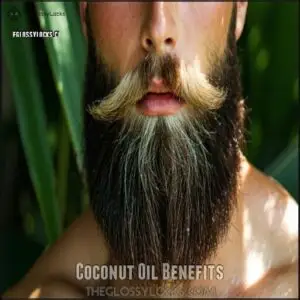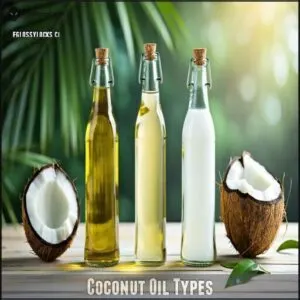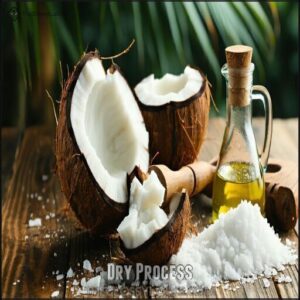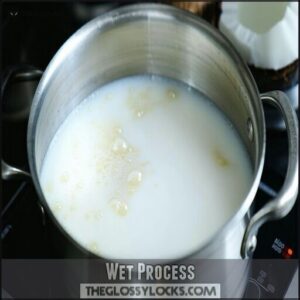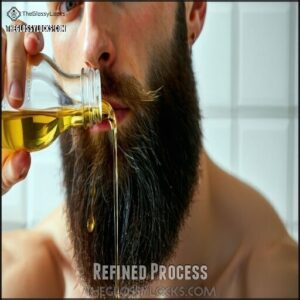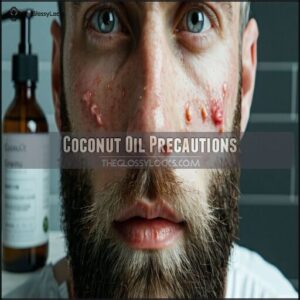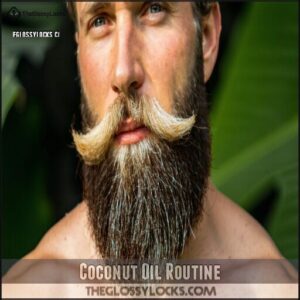This site is supported by our readers. We may earn a commission, at no cost to you, if you purchase through links.
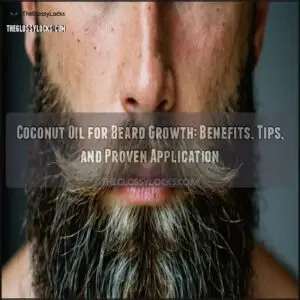 Coconut oil for beard growth works by penetrating hair shafts and nourishing follicles with essential fatty acids.
Coconut oil for beard growth works by penetrating hair shafts and nourishing follicles with essential fatty acids.
You’ll find it helps reduce breakage while moisturizing both beard and underlying skin.
Scientific evidence suggests the lauric acid in coconut oil may support healthier, thicker hair growth, though results vary between individuals.
Apply a pea-sized amount to your clean beard, working it through from roots to tips with your fingertips.
Many beard enthusiasts report reduced itchiness and improved texture within weeks.
The key lies in consistency—regular application delivers better results than occasional treatments.
Our application technique makes all the difference in transforming scraggly patches into enviable facial forests.
It is crucial to maintain regular application for optimal outcomes, as this ensures the healthier growth of your beard.
Table Of Contents
- Key Takeaways
- Coconut Oil Benefits
- Coconut Oil Types
- Applying Coconut Oil
- Coconut Oil Extraction
- Beard Growth Stimulation
- Coconut Oil Precautions
- Coconut Oil Routine
- Maximizing Benefits
- Frequently Asked Questions (FAQs)
- Is coconut oil good for growing beard?
- Which oil grows a beard fastest?
- How long does it take to grow a beard with coconut oil?
- Can I leave coconut oil on my beard overnight?
- Can I leave coconut oil in my beard overnight?
- How to grow a beard in 7 days?
- Is coconut oil a good substitute for beard oil?
- What is the best beard oil for growth?
- Which oil grows beard fastest?
- Is there any side effects of coconut oil on beard?
- Conclusion
Key Takeaways
- Coconut oil won’t magically accelerate beard growth, but it creates healthier conditions for your follicles by penetrating hair shafts and nourishing them with essential fatty acids like lauric acid.
- You’ll get best results by applying a pea-sized amount to your clean beard daily, working it through from roots to tips and paying special attention to the bottom part where dryness and split ends often hide.
- Consistency is crucial—make coconut oil part of your daily beard care routine, preferably applying it after showering when pores are open or at night when your skin naturally repairs itself.
- While coconut oil offers significant benefits for beard health, be cautious if you have acne-prone skin as its comedogenic properties can clog pores and trigger breakouts.
Coconut Oil Benefits
Coconut oil offers several benefits that can enhance your beard’s health and appearance. It moisturizes the skin beneath, reduces dandruff, and supports healthy hair growth by nourishing the follicles.
Improves Beard Appearance
Bringing out your beard’s potential, coconut oil enhances its appearance with a touch of natural charm.
By softening beard strands and locking in moisture, it guarantees each hair stays smooth and touchably soft.
This deep hydration prevents annoying flakes and also gives your beard a healthy shine that turns heads.
Regular use makes your beard appear thicker, taming flyaways and reducing split ends for a polished, richer look.
Just a small amount can work wonders—massage it evenly to see instant results.
- Key point: Embrace your beard’s best look with coconut oil that softens, tames stray hairs, and adds a shimmering beard shine while boosting its overall thickness.
Promotes Healthy Hair Follicles
Strong hair follicles lead to a healthy, vibrant beard. Coconut oil enhances beard hair follicle health by improving nutrient absorption and reducing inflammation.
When massaged onto your beard, this natural oil nourishes your skin while boosting blood circulation, which supports follicle strength and scalp health. Its hydrating properties soothe dryness and irritation, creating the perfect environment for consistent beard growth.
For lasting beard nourishment, make it part of your daily routine—your follicles will thank you. Fractionated coconut oil can enhance moisture absorption into the hair shaft.
Healthy follicles truly lay the foundation for impeccable beard health, and using coconut oil is a great way to support impeccable beard health and promote consistent beard growth.
Stimulates Hair Growth
A healthier, fuller beard starts with giving your follicles what they need to flourish. Coconut oil, loaded with medium-chain triglycerides, nourishes hair follicles and promotes better blood circulation to the skin under your beard. This improves nutrient delivery, helping your beard grow thicker and stronger.
Coconut oil delivers essential nourishment to your follicles, creating the perfect foundation for a thicker, stronger beard to flourish.
It’s also packed with lauric acid, which may support healthy hormone balance and provide mild DHT inhibition—important for consistent growth.
To access its potential:
- Use virgin coconut oil, as it’s the least processed and contains more nutrients.
- Warm a small amount between your hands to make it easier to apply.
- Massage it deep into the beard and skin to promote follicle nourishment.
- Apply daily for the best results.
- Pair with lifestyle choices like hydration, proper sleep, and exercise to promote beard growth.
Think of coconut oil as your beard’s growth-boosting sidekick!
Reduces Beard Dandruff
Beard dandruff, or beardruff, can be uncomfortable and frustrating, but coconut oil makes it manageable.
It helps combat fungal infections, hydrates the skin, and keeps flaking at bay.
Here’s how it works:
- Hydrates skin to prevent dryness and beard itching.
- Its antifungal properties address dandruff at the root.
- Reduces product buildup for better scalp health.
- Encourages natural exfoliation methods to clear dead skin.
Say goodbye to flakes effortlessly!
Coconut Oil Types
Choosing the right coconut oil type can make all the difference.
Virgin coconut oil, minimally processed, retains its nutrients and coconut flavor, making it ideal for skincare and sensitive areas.
Refined coconut oil, on the other hand, undergoes more processing, resulting in a neutral taste and higher smoke point—perfect for cooking.
Fractionated coconut oil stays liquid, offering a lightweight, non-greasy feel.
Understanding these processing differences and flavor profiles helps you match the best uses of coconut oil to your needs.
For beard care, it’s worth noting that unrefined oil deeply hydrates for superior results.
Applying Coconut Oil
To apply coconut oil effectively, start by warming a small amount between your palms until it becomes liquid.
Then, massage it into your beard, ensuring it reaches the skin beneath for ideal nourishment and hydration.
Rub and Melt Oil
Warming coconut oil properly is key to getting the most out of its benefits for beard care. The right steps guarantee oil consistency and maximize skin absorption for healthy beard growth.
- Scoop a small amount of coconut oil—start small; you can always add more.
- Rub it gently between your palms to liquefy it, creating a smooth consistency.
- Apply with light, even pressure to your beard, facilitating even distribution from roots to tips.
- Avoid overloading—no one wants a greasy, weighed-down beard.
Use these warming methods for softer, nourished beard health!
Massage Into Beard
Massaging coconut oil into your beard properly can make all the difference in your grooming routine. After warming the oil in your palms, focus on how you apply it to maximize oil absorption and promote healthier beard growth.
- Spread the melted oil evenly while massaging gently in circular motions. This helps hydrate the skin and reduce dryness.
- Focus on the roots and skin beneath your beard since Application Frequency plays a role in conditioning.
- Adjust your massage pressure based on beard density to avoid irritation if you have skin sensitivity.
Consider using specialized beard products for enhanced results. A quick five-minute Massage Duration daily boosts your beard grooming game!
Emphasize Bottom Part
Don’t forget the bottom part of your beard when applying coconut oil—it’s where dryness and split ends often hide.
Neglecting this area can make your beard look rough and unhealthy.
Take a small amount of the oil, warm it between your palms, and massage it into the ends and the skin beneath.
This step is key for softening brittle hairs and preventing breakage.
The bottom section of your beard is prone to damage, especially if you’re using beard oil alternatives or shaving cream regularly.
Coconut oil nourishes these vulnerable areas, promoting beard growth and healthier hair.
Think of it as giving your beard a solid foundation.
Daily application, especially at night, guarantees hydration and long-term post-shave benefits.
Over time, you’ll notice smoother strands, reduced brittleness, and a fuller, more polished appearance.
Coconut Oil Extraction
To understand how coconut oil works for your beard, it helps to know how it’s made.
The oil is extracted using methods like the dry process, wet process, or refined techniques, each affecting its purity and properties.
Dry Process
The dry process is a traditional method for coconut oil extraction, ideal for beard growth benefits.
It involves:
- Drying coconut meat into copra.
- Pressing copra to extract oil.
- Filtering impurities for cleaner oil.
- Refining necessity guarantees safe use.
This method preserves fatty acids, enhancing hydration and post-extraction quality, but may require further refining to remove contaminants.
Wet Process
The wet process involves extracting coconut oil from fresh coconut milk, separating oil and water through methods like fermentation, enzyme use, or centrifugation steps.
This technique preserves nutrients, enhancing coconut oil benefits for beard growth. Though overheating can reduce quality, proper emulsion formation retains proteins essential for healthy hair.
It’s a nutrient-rich option for softer, shinier beards, making it popular in coconut oil extraction, and providing benefits for beard growth.
Refined Process
Refined coconut oil, processed through methods like bleaching and deodorizing, offers a neutral flavor and smooth texture. While the refining methods may cause some nutrient loss, the oil remains versatile and affordable, making it ideal for beard care and other coconut oil uses.
Its light consistency guarantees easy application without overpowering scents. A common type is RBD coconut oil, known for its stability and lack of odor.
Here’s why refined coconut oil works well for beard grooming:
- Cost-effective for daily use without sacrificing quality.
- Neutral flavor and scent, suitable for sensitive users.
- Multi-purpose, perfect for hydration, conditioning, and cooking applications.
This processing impact balances practicality with essential coconut oil benefits.
Beard Growth Stimulation
Coconut oil might support beard growth by nourishing hair follicles and maintaining healthy skin.
While it doesn’t guarantee faster growth, its nutrients and potential hormone-balancing effects could create a better environment for stronger, fuller hair.
Hormone Balance Impact
Through coconut oil, your beard’s hormonal ecosystem gets powerful support.
Coconut oil helps maintain essential balance between testosterone and DHT (dihydrotestosterone)—the primary hormones responsible for facial hair development.
| Hormone Factor | Coconut Oil Effect | Beard Result |
|---|---|---|
| Testosterone | Prevents oxidation | Fuller growth |
| DHT Conversion | Supports pathways | Thicker strands |
| Stress Hormones | Reduces cortisol | Consistent growth |
The medium-chain triglycerides in coconut oil act as hormonal health warriors, protecting testosterone from degradation while supporting proper DHT conversion.
This creates ideal conditions for follicle stimulation without causing endocrine disruption.
Coconut oil contains lauric acid properties that stimulate new hair growth.
Your thyroid function may also benefit, further enhancing the beard-growing environment without artificial ingredients.
Hair Growth Effects
Wonder how coconut oil actually affects your beard growth? The science points to several mechanisms that make this natural oil worth adding to your grooming routine.
- Follicle Nourishment: Coconut oil penetrates hair shafts deeply, delivering essential nutrients that strengthen each strand from within, potentially supporting a thicker beard.
- Growth Stimulation: When massaged into your skin, coconut oil improves blood circulation to hair follicles, creating ideal conditions for beard growth and helping prevent hairfall.
- Protective Barrier: The oil forms a protective shield around each hair, preventing damage that can stunt growth while simultaneously improving luster.
While not a miracle solution, regular application of coconut oil as a beard oil creates an environment where your facial hair can reach its full potential.
The result? A healthier, fuller-looking beard without expensive products.
Coconut Oil Precautions
While coconut oil offers numerous benefits for beard care, you’ll need to be aware of potential skin reactions including acne from its comedogenic properties.
You should test a small amount on your skin before applying it to your entire beard, especially if you have acne-prone skin or sensitivity to coconut products.
Skin Reactions
Testing your skin’s tolerance should be step one before applying coconut oil to your beard.
Despite its benefits, this oil can trigger irritation symptoms like redness, itching, and skin inflammation in some individuals.
Allergic dermatitis may develop, especially if you’ve got sensitivity to coconut products.
Due to its comedogenic nature, pore clogging is a legitimate concern when using coconut oil around facial hair.
Before full application, conduct sensitivity testing on a small area behind your ear or inner wrist.
Wait 24 hours to check for reactions, and remember that what works for others mightn’t work for you.
Your skin’s unique response should guide your beard care decisions, and it’s crucial to prioritize your skin’s health when introducing new products like coconut oil.
Always consider the potential risks, including allergic dermatitis and skin inflammation, to ensure the best results for your beard and skin.
Acne and Clogged Pores
One major drawback of coconut oil is its pore-clogging potential, which can trigger beard acne for many users. Despite its benefits, this oil ranks high on the comedogenic scale.
- Different skin types react uniquely—oily skin faces higher acne severity
- Washing frequency matters—cleanse your beard thoroughly before and after application
- Alternative oils like jojoba and argan won’t cause pore clogging
- Using too much coconut oil overwhelms follicles, trapping bacteria and dead skin
- Regular exfoliation helps minimize comedogenic effects
If you’re prone to breakouts, consider patch testing first. When acne appears after coconut oil use, it’s not coincidence—it’s your skin sending a clear message about the importance of beard care and understanding comedogenic effects. Additionally, being aware of acne severity can help in making informed decisions.
Allergic Reactions
Some folks react badly to coconut oil when it touches their beard area.
Before applying it fully, conduct a patch test by dabbing a small amount on your inner wrist for 24 hours.
| Reaction | Symptoms |
|---|---|
| Mild | Slight redness, minor itching |
| Moderate | Skin irritation, inflammation |
| Severe | Intense burning, swelling |
| Acne | Breakouts, especially on acne-prone skin |
| Allergic | Rash, hives, respiratory issues |
If you experience any reaction symptoms, wash the area immediately and consider alternative oils like jojoba or argan instead.
Always identify allergens before committing to any beard care routine.
Coconut Oil Routine
You’ll need a consistent application schedule to maximize coconut oil’s benefits for your beard growth.
Apply a small amount of warmed oil to your clean, dry beard daily, preferably at night when your skin can fully absorb its nourishing properties without interruption, using a consistent application schedule to see the best results.
Daily Application
Consistency forms the foundation of effective beard care with coconut oil. Apply a pea-sized amount to your palms each morning, warming it between your hands until it liquefies.
Gently massage the oil from roots to tips, ensuring complete absorption through circular motions. For ideal timing, consider applying after showering when pores are open, enhancing absorption techniques.
Control quantity based on beard length—less for stubble, more for fuller growth. Many users find success with specialized beard products.
Integrate this 2-minute routine seamlessly into your morning regimen for maximum beard growth benefits. Most beard enthusiasts see best results with daily application, though you can adjust frequency based on your skin’s natural oil production and climate conditions. Your beard will thank you!
Hydration Tips
Throughout your beard care journey, proper hydration is essential for maintaining a healthy, manageable beard.
Water intake directly affects how your beard absorbs coconut oil. Apply this natural beard moisturizer when skin is slightly damp to maximize oil absorption and seal in moisture.
Climate effects can impact hydration needs—use more coconut oil in dry environments and less in humid conditions.
Consider night hydration by applying before bed when your skin naturally repairs itself. For enhanced results, pair coconut oil with a water-based humectant first to draw moisture into hair fibers.
Many find that beard hydration products can further improve beard health.
- Picture your beard like a plant—it needs both water and nourishment (coconut oil) to thrive.
Long-Term Use
Many beard enthusiasts discover that long-term coconut oil use yields cumulative benefits beyond initial results.
With sustained hydration, your beard transforms over weeks, not days.
Follow this consistent regimen for ideal beard health:
- Start with pea-sized amounts to prevent overwhelming facial pores
- Maintain daily application, even when results aren’t immediately visible
- Incorporate weekly deep cleansing to prevent potential drawbacks like buildup
- Document monthly progress with photos to appreciate subtle improvements
Remember, beard oil isn’t just grooming—it’s an investment in follicle health.
Your patience will be rewarded with a beard that’s not just fuller, but noticeably healthier.
Maximizing Benefits
You’ll maximize coconut oil’s beard benefits by pairing your topical application with proper nutrition and regular exercise that supports hormone balance.
Tracking your beard’s progress with monthly photos helps you assess improvements and adjust your routine for ideal results.
Combining With Diet
Combining coconut oil with a strategic diet can enhance your beard growth dramatically.
When applied topically and consumed internally, coconut oil works synergistically with nutrient-rich foods.
| Dietary Component | MCT Benefits | Hormone Production |
|---|---|---|
| Dietary Fats | Improves nutrient absorption | Supports testosterone |
| Calorie Intake | Provides energy for follicles | Prevents hair loss |
| Superfoods | Reduces inflammation | Stimulates growth cycles |
Consider adding 1-2 tablespoons of coconut oil to your daily meals alongside beard-friendly dietary supplements like biotin.
Exercise and Wellness
Pumping iron at the gym does more than build muscles—it fuels your beard growth journey.
Regular exercise boosts testosterone levels and improves blood circulation to follicles, enhancing coconut oil’s effectiveness.
Combine this with proper hydration, quality sleep, and stress reduction techniques for ideal results.
Even simple activities like walking can increase your metabolic rate while supporting the natural beard-growing process that coconut oil helps nurture.
Monitoring Progress
While exercise enhances blood flow to hair follicles, monitoring your beard’s response to coconut oil treatment is equally important.
Hair growth serums, for example, often include ingredients to stimulate follicle production.
Track your progress by taking weekly photos from the same angle and lighting. Measure beard length with a small ruler and note thickness improvements in your consistency log.
Create a simple tracking chart:
Adjust your coconut oil routine based on these measurements for ideal beard growth.
Frequently Asked Questions (FAQs)
Is coconut oil good for growing beard?
Coconut oil moisturizes, nourishes, and protects—but doesn’t directly stimulate beard growth.
It may create healthier conditions for your follicles, giving the appearance of a fuller beard through improved hair health and reduced breakage.
Which oil grows a beard fastest?
No oil has been scientifically proven to grow beards fastest. Your best options include castor, jojoba, and peppermint oils, which may improve follicle health rather than directly accelerate growth rates.
How long does it take to grow a beard with coconut oil?
Growing a beard isn’t a sprint, and coconut oil won’t magically speed it up.
While it moisturizes and nourishes, beard growth mainly depends on genetics, hormones, and care.
Expect subtle improvements, not overnight miracles.
Can I leave coconut oil on my beard overnight?
Yes, you can leave coconut oil on your beard overnight.
This allows maximum absorption and nourishment.
Just use a small amount to avoid greasy pillowcases and potential skin irritation if you’re acne-prone.
Can I leave coconut oil in my beard overnight?
Absolutely, you can leave coconut oil in your beard overnight for maximum moisturizing benefits.
It’ll deeply condition your hair and skin while you sleep, making your beard softer and more manageable by morning.
How to grow a beard in 7 days?
Think of your beard as a garden—you can’t rush growth, but proper care helps.
Cleanse daily, moisturize with oils like coconut, eat protein-rich foods, and massage the skin to boost blood flow and stimulate follicles.
Is coconut oil a good substitute for beard oil?
Coconut oil works well as a beard oil substitute.
It moisturizes your skin, softens beard hair, and may promote healthier follicles.
However, it’s comedogenic, so avoid it if you’re prone to acne.
What is the best beard oil for growth?
While research doesn’t support "growth" claims, oils with jojoba, argan, and castor can nourish follicles.
You’ll get best results from a blend with peppermint oil, which improves circulation to hair roots.
Which oil grows beard fastest?
In a world of infinite beard promises, peppermint oil shows the most scientific evidence for faster growth.
Studies indicate it stimulates follicles and increases blood circulation.
You’ll find castor oil helpful too, though results vary with genetics.
Is there any side effects of coconut oil on beard?
Yes, coconut oil can clog pores causing acne around your beard area. It’s not ideal if you’ve got acne-prone skin and won’t actually accelerate growth despite popular claims.
Conclusion
Like a dormant seed awaiting water, your beard craves nourishment to flourish.
Coconut oil for beard growth isn’t just a trend—it’s a science-backed approach to transform your facial hair.
You’ll notice improvements in thickness, softness, and manageability when you commit to regular application.
Remember, patience is essential; results develop gradually.
By incorporating coconut oil into your grooming routine, you’re investing in a healthier, more impressive beard for the long term.
- https://thebeardandthewonderful.com/blogs/how-to-guides/is-coconut-oil-good-for-your-beard
- https://gyalabs.com/blogs/essential-oils/coconut-oil-for-beard-growth
- https://www.vedaoils.com/blogs/essentialoils/coconut-oil-for-beard-growth
- https://bnborganics.com/blogs/news/coconut-oil-for-beard-benefits-drawbacks-and-more
- https://www.healthline.com/health/beauty-skin-care/coconut-oil-for-beard

